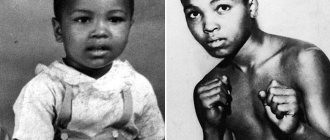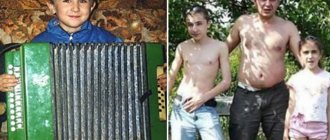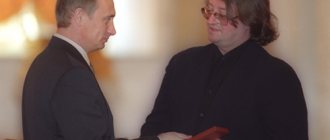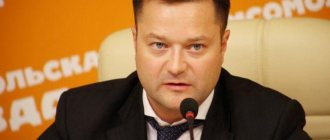Coming from the Baltic states, it was as if he had flown in in a time machine from the times of the USSR, when artists did not argue about politics and did not divide their colleagues into strangers and their own. His songs, according to one fan, “fall on the soul like butter on warm bread.” Intelligent, reserved, gentle, he knows how to joke and laugh at evil jokes addressed to himself. Intars Busulis is a Latvian singer who was immediately accepted in Russia as a native: he sings so well in Russian, but most importantly, he guesses at the subconscious level the desires and tastes of our viewers. For older fans, he evokes burning nostalgia for the times of Vaikule and Pauls, and for younger fans, Busulis proves with his creativity: art does not know wars, borders and political quarrels, it should always be above this.
Where was this talented artist, devilishly attractive man, faithful husband and father of many children born and raised? How did he decide to start performing on the Russian stage? After all, now, unfortunately, it is a rare case when singers from the countries of the former CIS are eager to come to Russia with concerts. How does Intars look at relations between our countries and what does he think about the possibility of bringing together once friendly peoples? Is there any serious reason for rumors about his affair with Elena Vaenga? These and many other questions are of interest to the artist’s already large army of admirers. He is a very open and sociable man, he readily gives interviews, but still journalists call him “a book that has not been fully read” - he is so multifaceted both as a person and as a creative person.
Official data
- First and last name: Intars Busulis;
- Place of birth: Tulsa, Latvian SSR, USSR;
- Date of birth: 1978, May 2;
- Zodiac sign: Taurus; according to the eastern calendar - Horse (element of the year earth), patron planet Venus;
- Occupation: singer, musician, composer;
- Proficiency in musical instruments: trombone;
- Genres of performance: jazz, funk, pop, [email protected] ;
- Marital status: Married; wife – Inga Busulis;
- Children: sons Lenny and Janis, daughters Amelia and Emilia.
About childhood and youth
Intars was born in the small town of Tulsa, Latvia (the city has another official name - Talsi). The Busulis family had many children - the artist had two brothers and two sisters. The boy grew up in a small Baltic town (currently the population is just over ten thousand) with a rich history: Talsi has been known as a settlement since the 13th century, and survived the invasions of Poles, Swedes and Russians. The place where a person was born and spent his childhood always influences his development as a person: there is no doubt that the ancient walls of his hometown, remembering history, had a special impact on the boy who would later become a world-famous singer.
Intars Busulis with his beloved mother. Photo https://www.instagram.com/intarsbusulis/
The artist hardly talks about his parents, but from his statements about his childhood one can understand that the family was an ordinary one, without fantastic earnings. Five brothers and sisters - their parents raised them all to be decent people, and the main thing that was instilled in them by their father and mother: they must always stick together, help each other and protect. Despite the fact that the children sometimes quarreled and even fought (what would childhood be without fights?), they firmly remembered this fundamental truth. Intars recalls that both on the street and at school everyone stood by each other like a mountain. When the boy grew up a little, he even defended his older sister if she was offended.
If there were not very “smooth” moments in childhood, many celebrities like to hide it, there are even cases when “stars” outright lie: they tell how “white and fluffy” they were, but in fact they were hooligans and did not always behave properly . Busulis is not like that: he openly says that as a teenager he was far from a good boy. I wasn’t a very good student, except that my grades in music were almost always excellent. The singer, in one interview, laughingly told how he and his friends “stole” rolls in a bakery store on a bet, but then they always paid for them.
https://www.instagram.com/intarsbusulis/
Another area of his revelations is the family situation. “I’m sure I’m such a “Mexican” in terms of the explosive nature of my parents, they still have Latin American passions raging at home,” his words. Intars loves to tell how at one point, during a showdown with his brothers and sisters, a huge hole was made in the wall - the situation in the quarrel became so tense. Then everyone made peace safely, and the hole in the wall was covered with a beautiful painting. Or another incident that he likes to describe: how his sister threw a log at him during a quarrel, and the piece of wood miraculously did not gouge out his eye.
And also an incident from which the paparazzi regularly try to make a scandalous topic: supposedly Busulis, as a teenager, almost went to prison. And every time the artist dispels doubts by openly talking about his supposed “criminal past.” A group of guys wanted to go for a ride, and they borrowed someone else's car. They took it, yes, but they didn’t steal it! Because they drove it very carefully, nothing was stolen from it, and then they parked the car... in the middle of the stage of a summer theater! “My friends and I all loved music so much back then that it was no coincidence that we chose the theater where we left the car.” The car, apparently, was safely returned to the owner, and after the story about the “hijacking,” Intars says every time: “I’ve done so many good deeds in my life that I’ve probably atoned for my guilt for that prank many times over.”
https://www.instagram.com/intarsbusulis/
Studying was not going too well, but the parents did not “pressure” the child: they immediately realized that he had a musical future. The boy went to dances and also went to music school to study trombone. As an adult, Busulis sincerely regretted that he did not pay attention to the instrument and did not become a professional. But it was playing the trombone, in his opinion, that allowed him to become a good singer - it developed his excellent “breathing ability.” The boy's older sister (with whom Intars was especially friendly in childhood) entered the music college in Ventspils, and it was decided to send her younger brother there. “My parents thought that it would be more fun for us to study together, and if anything happened, we could protect each other and help,” the musician later said.
Biographical information
The popularity of Intars Busulis increased after participating in the vocal show “The Voice”. But before appearing on Russian television screens, the Latvian singer, musician and composer was well known in the world jazz community.
Family ties
Intars was born into a large family. He has a brother and three sisters. Busulis's relatives still live in the city of Talsi. The singer often comes to visit them. Intars' sister, Rebecca, is a music teacher and works as a clown doctor in a hospital in the port city of Ventspils.
Childhood and youth
Intars has been involved in music since childhood. He showed interest in musical notation following his older sister Rebecca. The boy learned to play the trombone at a local music school. The young trombonist rehearsed and performed with the children's ensemble. The boy improved his hearing and sense of rhythm in dance classes. Choreography lessons helped me feel confident in front of the audience.
In his youth, Intars and his friends formed the group “Caffe”. He was chosen as a soloist. The talented vocalist was in demand as a musician - he played the trombone in the national military band and in the jazz group Wet Point. Intars also has experience as a radio presenter.
Education
Intars Busulis graduated from the music college in Ventspils. He also studied at the Music Academy in Riga.
See also
Biography and personal life of Anastasia Gold, interesting facts and plans for the future
The beginning of a creative career
After college, he worked for some time as a presenter at the Riga radio station Radio SWH. Port, together with a friend, the young man created the group “Caffe”: this friend was Raimonds Tigulis, who a few years later became a famous musician and composer in Latvia. The beginning of Intars’ activity was, sadly, closed to Russian art connoisseurs, but the young man achieved significant success and steadily moved up the creative “ladder”:
- in the early 2000s: played in the brass band of the Latvian Armed Forces;
- a little later: joined the jazz group “Wet Point”;
- 2005: performed as a musician (trombone) and singer in the group “EYJO”, this was a project of Danish bass guitarist Erik Mosuholm;
- same year: goes to the New Wave competition.
We need to talk about the last fact in more detail, because it was there, in Jurmala, at a competition for young performers, that Intars Busulis announced himself as a talented performer in front of an international audience. His performances were admired by the audience, members of the jury: Raymond Pauls and Igor Krutoy (co-chairs), the Meladze brothers, Leonid Agutin, Alla Pugacheva. He was applauded by “distinguished” guests, among whom were Joseph Kobzon, Valery Leontyev, Igor Nikolaev. The singer took first place in this competition, ahead of such undoubtedly interesting participants as Tina Karol (2nd place) and Polina Gagarina (3rd place).
Intars Busulis and Raymond Pauls
His regular performances in Russia are still far away, but the artist is becoming incredibly famous in his country. His first disc in English, “Shades of Kiss,” was very favorably received by music lovers (released in 2005). And when he released his second album together with Karlis Latsis, they started talking about him as a “national treasure”. The collection “Kino” included songs in both Latvian and Russian, and the single “Brivdiena” performed by Busulis immediately took first place in the chats of Baltic radio stations - this happened in 2008.
A large concert tour in Latvia is how he “consolidated” his unexpected success after the release of the collection “Kino”: by the way, the album was released in two versions, and with the Russian title “Kino”. And that’s when they started talking about him seriously in Russia: already on television and radio they started playing his songs and talking about the talented Latvian artist. His performance at Eurovision in 2009 formed the first large group of fans in our country, especially since he sang the song “Traffic” in Russian in Moscow. Before Eurovision, he was invited to Channel One’s morning program, where Intars was introduced to viewers as an interesting and promising musician.
https://www.instagram.com/intarsbusulis/
Performances on national television and radio, tours around Latvia, new albums, serious national music awards - this gave the singer the opportunity not to be upset that he did not even make it to the finals at Eurovision. For some time now, winning this competition cannot be considered a serious achievement at all, what can we hide: the project has long become not musical, but political, even the selection for it is often carried out not according to the choice of talents, but according to other criteria. The singer subsequently recorded the single “Traffic” in English, and this song is still gaining high ratings among his admirers.
2013: Intars begins working at the Riga theater “Dailes”: there in the musical “Eugene Onegin” he performs the role of Alexander Sergeevich Pushkin - surprisingly, he constantly gravitated towards Russian heroes, towards Russian culture, without forgetting for a moment his , national. At that time, he also actively performed on Latvian radio - he sang as part of a big band. And ahead of him is a significant meeting with a famous Russian performer and resounding success.
About Lyme and Pauls
Photo source: instagram.com/ intarsbusulis/
Photo source: instagram.com/ intarsbusulis/
Egor Khrustalev: Latvia is a very small country, even compared to Belarus. But in fact, there are a lot of truly iconic musical characters. And those who perform songs like Laima, for example, and music that personifies the very golden era of Soviet pop music, written by Raymond Pauls. Why do you think this happened?
Intars Busulis: Luck, probably – most likely. I was lucky too. And this, of course, is the talent of Raymond Pauls. And, most importantly, they, as people, are very nice. And they treat you like friends. And Laima Vaikule and Raymond Pauls. And this is the best thing that can happen in a talented musician.
Collaboration with Elena Vaenga
She herself called Intars at the end of 2013: captivated by the voice and charisma of the Latvian singer, Elena Vaenga simply “fired up” with the idea of singing with him. “Why did you come to Astrakhan?” - Busulis was often asked later, to which he replied: “It didn’t matter at all where we were supposed to meet, Elena insisted so ardently, and she was in Astrakhan at that moment, so that’s where I went.” Another quote from an interview about that meeting: “I put on (I don’t know why) the reddest trousers and an incredibly bright checkered jacket, and in this form I appeared before Vaenga.”
Intars Busulis and Elena Vaenga – Neva
The Russian singer offered her colleague cooperation and the opportunity to enter the big Russian stage. And here it is, the finest hour for both: January 2014, the Great Concert Hall “Oktyabrsky” in St. Petersburg,” Elena Vaenga’s solo concert and her appearance in a duet with Intars Busulis, performing the song “Neva.” It was like a double explosion - our singer at that time did not need additional “promotion,” but the single raised her popularity to unimaginable heights, and next to her, Busulis ascended to the very top of the musical life of Russia.
He takes absolutely no offense to the caustic hints of journalists that he owes his popularity in our country to her. And he says with a smile: “Can this be offensive? Of course, without her and her song “Neva” I would not have had such success, I don’t argue with that!” And he immediately adds: “But Elena will not deny that her success with this single is partly mine.” By the way, that same summer the singer came to Jurmala for her partner’s solo concert - they performed with this song, already famous throughout the world of the former USSR, with great success. And in the fall they were invited again to Russia - to the Golden Gramophone. Before that, they continued to delight their fans with a hit on “Russia 1” (the “Saturday Evening” program) and on the First (“Songs for Loved Ones”).
This song not only brought Intars huge success in Russia, it became a powerful impetus for the start of his large-scale tours in our country. The phenomenon of his emerging popularity is surprising: not some well-known brand like “Black Star”, nor the great Diva Alla Pugacheva, nor any venerable composer, but a “folk” singer, who herself achieved fame, contributed to his success on Russian stages. And what is even more remarkable is that he readily accepted the offer of cooperation, did not “stand in a pose” like some musicians, with the words: “I will not go to the “former”, to the occupiers and invaders!”
A small digression from the topic of the relationship between Busulis and Vaenga is now simply necessary. He is a person outside of politics, never makes harsh, politically “tinged” statements. Until a certain moment, he refused to talk about politics at all; the singer immediately voiced this topic, along with his finances, in an interview as categorically forbidden. Like a true Baltic intellectual, Intars knows how to control himself, but in a recent interview he could hardly suppress his irritation when he was asked to comment on several quotes from his politicians about the Russians. The conversation was about how “Russians in the Baltics should know their place” and about “the Russian louse that should not be allowed into a fur coat.” Hearing these “pearls,” the singer covered his ears and exclaimed: “I don’t want to know who said that! Aggressive nationalism, especially voiced by well-known politicians, is unacceptable!”
This is how he is, a person outside of politics and big national strife - he thinks only about art, deals exclusively with creativity. His cultural union with Elena Vaenga is so harmonious that you wouldn’t even think at first glance: they are from different countries, they have different native languages. Truly, real art is higher than any incomprehensible situations between peoples, they both successfully prove this once again. The radio station “Chanson” not only played the song “Neva” many times to its listeners - in May 2014, this single remained in first place for three whole weeks.
And then there was “Gravity”, their joint performances in Moscow and St. Petersburg, his confession in front of a full hall of fans: “Elena, I adore you!” Well, will this be missed by cunning journalists? Isn’t this a reason to give rise to the rumor that Elena Vaenga and Intars Busulis are having an affair? And they both confirmed it: “Yes, we are having an affair!” Moreover, it is mutual and mutually strong. But not like between a man and a woman, but creatively.” And the singer, only fueling the rumors, added: “I like her, but not as a woman, but as... a girl! Tender, modest, sensitive, vulnerable. I don’t see anything wrong with this.” Those who love to pick the bones of celebrities will never understand such a high relationship: when a creative union can be much stronger than a “carnal” one.
Intars Busulis: “Very sincere people live in Russia”
During times of political tension, it is important to maintain not only calm, but also a positive attitude. Intars Busulis generously shared both of these with the portal RuBaltic.Ru: a Latvian singer, a participant in the show “The Voice” on Channel 1, who became popular in Russia. Intars is living proof of how art can exist outside of politics, and human relationships can not succumb to provocations:
— Intars, how did you end up on the screen of Channel One in the “Voice” project?
- This is pure coincidence. My friends and colleagues from St. Petersburg once asked if I would like to take part in such a show. I had heard about the “Voice” project before, but I didn’t even know that something similar existed in Russia. I immediately answered “yes,” although at first it seemed unrealistic to me that an unknown guy from Latvia could get into the project and even somehow make his way there. But it turned out to be completely different, completely different! In general, I decided that no one would hit me on the head for my initiative, and I filled out the form. I was selected from many applications - either 13, or 30 thousand, I don’t remember. I found myself in the first stage of the qualifying round and reached the semi-finals.
— Did you have to spend a lot of time in Moscow?
- During “The Voice” - yes, a lot. Within the framework of “Exactly the Same” - too, but during “The Voice” especially. I think I was in Latvia for ten days throughout December. The rest of the time was spent in Moscow.
On the one hand, it was constant stress and uncertainty. I had to cancel all planned activities in Latvia: because you don’t know whether you will go further or not. It was necessary to adjust the concert schedule to the project. Everything was up in the air, but people were understanding about it. On the one hand, with regret if the next concert in Latvia was cancelled. On the other hand, they were happy for me.
— How do you like Moscow?
- I like it. I walked a lot and looked. I liked to observe and analyze, look for similarities and differences in how people live in Moscow and Latvia. So I walked around alone, exploring the city.
But I didn't have much time for this. As soon as I arrived, I immediately had to do a lot of things. As a participant in the project, I was very busy; there was always something to puzzle over. Prepare new compositions, learn lyrics, etc. It was, of course, a lot of stress.
— You say you explored life, compared Moscow and Latvia. And what's your resume?
- Oh, this is quite difficult. A lot of things. Russia is huge.
In Latvia, you understand how and what people to talk to and how they will react to you, depending on whether you are talking to a person from Kurzeme, Vidzeme, Zemgale or Latgale.
In Latvia, the way of life differs depending on the regions. Each volost also has different people. And Russia is big, there are many regions. And all their representatives gathered in Moscow, in one city. This is such a mess that it is impossible to understand what a person really thinks and what he wants. Or at a concert: if the audience likes you, then they like you, if not, then they don’t. People in Russia are very direct, very!
- Is this a plus or a minus?
- This is a plus, of course. If we talk about the concert, then it’s definitely a plus: the audience is open, and you feel and understand them better.
— Do you think you could live in Russia?
- No, what are you talking about? Latvia is my homeland, my children go to school here, everything is here. All my loved ones, relatives, friends. This is my ensemble.
This is my foundation, my foundation. No, I cannot imagine living in another country, be it Russia or Switzerland, or any other country.
I wouldn't be able to get across, it's impossible.
— After “The Voice,” did you have many star Russian acquaintances? New joint projects?
- Well, not so much. We have known Elena Vaenga for a long time, about three years already. We sang together at the Slavic Bazaar in Vitebsk, even before the Voice. So there were common songs even earlier. And yes, I met other Russian performers during the project. With Leonid Agutin, for example, with Grigory Leps. Grigory Leps, can you imagine, even came to our concert at Crocus City Hall in Moscow! It was a pleasure. I invited him to the concert, but I didn’t think that he would come. And he came with a bouquet of flowers and congratulated me. I was shocked, to be honest!
— What do you think about the transfer of “New Wave” from Jurmala?
— Naturally, this cannot be good news for Jurmala. Every year Jurmala prepared for the “New Wave”. Everyone hoped and expected that there would be a “New Wave”. People were getting ready. But now, unfortunately, people are ready, but there will be no “New Wave”.
I played at various events, at parties. And I have a feeling that half of Moscow celebrates its holidays and anniversaries in Jurmala. It seems to me that they will always be here, and there will still be demand for Jurmala, even without the New Wave.
Jurmala is a beautiful, well-groomed, clean city, and I have no doubt about its bright future even without the New Wave.
I am neither for nor against the competition of young performers being held in Sochi. Moreover, this year I will participate in the “New Wave” in Sochi.
— On the jury?
- No, what are you talking about (laughs)
. It has its own competent jury. I am like a performer.
But change had to happen. Of course, this is part of the political game. And we had to understand that we couldn’t just take part in it and not bear responsibility for it.
I believe that the New Wave will return to Jurmala. How can she be in some other city? I can't wrap my head around this. Everyone will get together, calm down, make peace, and the “New Wave” will return to Jurmala.
— In your opinion, can culture and art be a soft political force?
- Once upon a time it was like that. Whether you like it or not, artists were used for political games. But I don't fall for it.
If they ask me something, if I feel that they want to use me, then I won’t be there - I will immediately refuse.
I will give up everything, even if it is “Voice” squared. If there is even the slightest political subtext.
— And in another sense: is it possible to smooth out sharp political angles with the help of the cultural sphere?
- Of course, of course you can! But I wouldn't want artists and culture to be used. I would like the good to serve the good. I don’t want to become “material for smoothing corners” even for a short time, just to fill this void. I want people to come to my performances and become calmer, and for everything to only go for the better.
I haven't cracked under the pressure of TV yet. I don’t watch anything like that except movies on a projector with my children. It's much more useful. I step over all these political topics. If I go online, I scroll through “politics”, “money”, “oil”, “weapons”, all this. I'm walking past. I'm tired of this nonsense. For myself, I know what I want, what kind of people I communicate with and what my political position is.
— What is the difference between a Russian audience and a Latvian one?
- When we had our first concert in St. Petersburg - February 19 - we, frankly, were in shock. After the first composition, people seemed to open up. And until the very end of the performance, it felt like we were having a meeting of a sect: people were joyful and open, generously expressing their emotions. There was no need to say anything, everything was just perfect! Here, in Jurmala, in Riga, people are less open. We live by the sea, we are calmer. Like in jokes. This is probably how it should be. To warm up the audience, you have to try a little.
In Russia you also have to try - there you have to show a very high professional level. In Russia you have to try twice as hard because you are a guest, it takes effort to be accepted. But in Latvia you have to try to stir up the audience a little. It doesn’t happen that the audience opens up right away. But this is also good in its own way.
Our regions of Latvia are also so different that many people don’t even imagine it. Because Latvia is actually big and different. To do this, you need to follow some artist at concerts in Latvia: in Cesis, Ventspils. Even in Rezekne and Daugavpils the audience is different, although the distance between the cities is not so great! In Latgale, for example, the hall responds faster. It is a tradition in Ogre to applaud and shout during a performance. Yes, it is very different. Latvia is cool!
— What is your most vivid Russian memory?
— This is probably the most important point. I performed the song “I draw you” on the “Voice” project. The filming had already ended, the next day arrived, I was flying on a plane, but I still couldn’t calm down. I didn’t have time to calm down after this song, I was in a state of slight shock. This performance, the bright lights - everything was well filmed, although I did fake it here and there. During the project, all my emotions were concentrated and canned: I was both scared and in a state of stress all the time. I don’t even know why, maybe I was afraid whether I would go further or not. But then the excitement appeared. It’s good that I’m in the semifinals, it’s good that I got there at all. The further you go, the more excitement appears.
And when I sang the song “I draw you,” I felt so good that I didn’t even care whether I went further or not. At that moment I got what I wanted from the competition: wonderful emotions. That moment when something special happens to you. You invested all your strength, and even money, into it - but we had to live on the project at our own expense. But with this song I made up for everything I put into the project. And for me this is a huge achievement.
— And how do you evaluate the results of your participation in the project?
- Cool! After that, I had my second show, “Exactly Exactly.” I got there thanks to “The Voice”. I found out that I was invited there before I even reached the semi-finals. We are still reaping the benefits.
Nothing is over, we just have to work and work. You can’t fall into melancholy and think about how good it was.
We need to move on. We must use this time before some other “Voice” appears.
— Are you planning a tour of Russia?
— On July 4 and 7 we had a concert in Dzintari, now there will be a performance in the Daugava Hall. Next I participate in Igor Butman’s World of Jazz, followed by Rīgas Ritmi, and still ahead is Summer Time. And 10 concerts are planned for the fall in Russia. On October 25 we are giving a concert at the Oktyabrsky Concert Hall in St. Petersburg. And then we’ll go to the regions for the first time!
- Not scary?
— It’s scary, of course, because I don’t know at all, I don’t represent that audience. We performed in Moscow and St. Petersburg. But these are two Russian metropolises. I don’t know what happens in other cities. I don't know what people will like and what they won't. But this is the most interesting thing. We've been given the opportunity to get to know how people live there, and it's wonderful.
Participation in “Voice”, “Exactly” and “Three Chords”
Already very famous in Russia, Busulis appeared on the “Voice” project in the third season in the fall of 2014. The single “I don’t mean a thing” he performed made Leonid Agutin, who was sitting on the jury, turn first: by the way, the singer would later join his team. And viewers of “The Voice” later, when the result of the blind audition was posted on YouTube, wrote: “And who will say now that the Balts are not hot guys? Easily, gracefully, sincerely, strikingly different from the other participants.”
Pelageya began to cry when Intars sang “I draw you” at the next performance, and the whole audience began to applaud from the second verse. And enthusiastic admirers of his talent wrote again on the Internet: “Busulis sang even better than the original, the best performance this season.” Also: “He literally gets into character, it was cool.” Critics, spoiled by the huge number of talented competitors on such projects, called him a “musical monster.” And the singer himself admitted: “I was terribly worried! The main thing for me was not to win, but to challenge myself. As I have been doing all my life, I challenge and want to express myself loudly.”
A little later, 2015, the project “Exactly”: he, in the image of Elton John, made Mikhail Boyarsky say: “Unexpectedly, great, and how accurate! It’s as if he was born with the destiny to sing Elton John!” And when he performed in the image of Tina Turner, the surprised Yarmolnik exclaimed: “As they said: where does the guy get his Spanish sadness? Where did he get this talent to portray the “volcano of passions” Tina Turner?” And he added after the number “a la Ozzy Ozbourne”: “Five, only five!”
Its popularity in Russia and other neighboring countries is already going through the roof. Busulis gladly accepted invitations to major events at that time (as he still does now). Is it possible to refuse those who are waiting for him with impatience and delight, saying: “Aesthetic, sophisticated, instantly captivating with every “live” performance,” - a fragment from an article about him in 2018. The artist no longer needs the support of Elena Vaenga, but continues to perform with her, performing the hits “Neva” and “Gravity” - Muscovites still remember their concert in March 2018.
Intars Busulis - “Variations on Gypsy Themes”. Three chords.
The fact that he was invited to Channel One’s project “Three Chords” is not at all surprising: the audience received a lot of positive emotions listening and watching the singer in his various incarnations. “Chistye Prudy”, “Lady Luck”, “Madam, the leaves are already falling”, and... “Murka”! Several years ago, when Busulis was asked about “thieves” songs and “Murka,” he categorically stated: “This style is popular with a certain listener, it has a right to exist, but such songs are not for me, I don’t even know the words to “Murka” " It turned out that he was capable of this direction - the master of chanson Shufutinsky praised this number as an “ace”: “Cool performance of a cool “piece” of the musical.”
Participation in the television project “The Voice”[ | ]
In the summer of 2014, Intars applied to participate in the popular TV show “The Voice” on Channel One[5]. On September 5, at the “Blind Auditions” stage, he performed the song “It don’t mean a thing,” accompanying himself on the trombone[6]. Two mentors of the project turned to him at the same time - Pelageya and Leonid Agutin. Intars chose Agutin's team. On October 24, at the “Fights” stage, Intars defeated his rival Michael Blaze, performing “Play that funky music.” On November 28, having won the “Knockouts” stage with the song “I Draw You,” he advanced to the quarterfinals of the television competition[7]. On December 12, having performed “I love you more than nature”, he reached the semi-finals. On December 19, he opened the semi-final of the TV show with Billy Joel's hit "Honesty".
What else has Intars Busulis been doing in recent years?
Intars is such a versatile and creatively liberated artist that he can perform (as we have already seen) in any role. And his tours are no longer limited to Latvia and Moscow: St. Petersburg is becoming one of the cities where he performs with particular pleasure. In 2016, the singer was invited as an honorary guest to the Days of Riga in St. Petersburg festival. In the same year, viewers of the program “New Year on First” saw him; a week later the artist came to Maxim Galkin’s program “MaximMaxim”.
2017: Intars’ new album “Nakama pietura” is released entirely in Latvian: touring is great, but you can’t forget about your fans. Then there was his visit to Jurmala for the Laima Vaikule International Festival - the singer performed on the stage of the legendary Dzintari Hall. And then there was a tour to Belarus, where Busulis gave a grand performance in the Minsk concert hall.
Solo concerts in Moscow, participation in the jury of the children’s project “Battle of Talents”, “Slavic Bazaar in Vitebsk”, the festival “Heat in Baku” - these are just a few of the events where the talented Latvian performer appeared in 2018. In April 2019, Busulis visited Israel and received a huge number of enthusiastic reviews from viewers and wishes to come again. This year, his immediate plans in our country include participation in the New Wave gala concert at the end of August. The singer will take the stage along with Philip Kirkorov, Irina Allegrova, Valeria, Yusif Eyvazov and other “stars”, and he himself is already a “star” of the same magnitude in our country.
The first songs of Intars Busulis
Busulis, together with Raymond Tigulis, organized the group “Caffe”.
This project turned out to be long-lived and lasted four years. During this time, the group gained some popularity, and Intars became a singer. Participation in “Caffe” was not the only activity of Busulis; at the same time he played in the jazz group “Wet point” and in the NVS Orchestra. As a vocalist, he participated in the EYJO - European Youth Jazz Orchestra project, organized by Danish bass guitarist Erik Musholm. This was in 2005. Then the performances followed one after another. Busulis could be seen at the Lithuanian jazz festival “Kaunas Jazz”, and at jazz festivals in countries such as Canada, France, Finland, Estonia and Latvia. He was invited as a vocalist to musicals and musical productions, including such a famous musical as Notre Dame de Paris. Together with Uldis Markhilevich and Aja Vitolinja, the singer took part in a musical project called “Viva la bomba”.
About his personal life
...A guy of about seventeen or eighteen years old was walking with his girlfriend along the street of his native Tulsa, and another couple was walking towards them, and he immediately drew attention to the young beauty. “You bet I’ll be with her tomorrow?” - Intars said to a friend, and it was he, that young man who immediately “set his eye” on the stranger. She was only fifteen at the time, and the result of an argument between a guy and a friend was that they actually broke up with their partners the next day. And from that moment they never separated - surprisingly, unlike many celebrities, Busulis has been an exemplary husband and caring dad for many years.
with my wife...
He calls his wife Inga: “My boss, my Muse, my love for life.” And he adds: “Of course, we do not live ideally. We even swear! But after these “Latin American” showdowns, we will definitely apologize and make peace.” He said about this in one interview: “Darlings scold, they just have fun,” - this is definitely about us.” An interesting man who has a huge number of fans, he never tires of repeating that he never even entertains the thought of betrayal: “A family is created for love and a long life together, and not in order to destroy it.”
The joke that the Busulis couple gave birth to four children in order to pay less taxes is the singer’s favorite. He confirms that, as parents of many children, he and Inga have many benefits in Latvia: travel on transport, bonuses in stores and much more. But of course, this was not their main goal, to receive some benefits from the state. He just grew up in a large family, and knows how important it is when several brothers and sisters can help each other at any moment.
with daughter
Interesting fact: born in the city of Tulsa (like Inga), he made sure that his children were born in his hometown. “My mother works there in the maternity hospital, and Inga and I specially came there every time before the birth of the next baby,” said the artist. His love for his native places is so boundless that even his dog and cat are from there! Two daughters and two sons (the last son was born in 2019), and everyone needs to be taken care of, everyone needs to be given attention - Intars can talk about this endlessly. He loves to share such little things that the family must have a joint breakfast and walks in nature.
Intars Busulis with his daughter. Photo https://www.instagram.com/intarsbusulis/
The singer does not really like to post photos with children on his social networks. The last baby has not yet managed to “show up” anywhere, neither on Instagram nor on other sites. “I used to publish photos, but now I try to do it as rarely as possible. I don’t like it when my children are carefully examined and discussed,” a fragment from an interview. And in general, Busulis believes that social networks and the Internet are a very dangerous phenomenon, evil, especially for children: “This limits the circle of communication very much! It seems that there are a lot of virtual friends, but there are fewer and fewer real ones.”
He not only loves his hometown and country - he can be called a super-patriot without exaggeration. This is how Intars talks about raising children: “First of all, they should love Latvia. I want to make them conscious people who will benefit their region.” When she and Inga were not yet a large family, the singer’s wife worked, but now she devoted herself entirely to the house: “Is it worth explaining how much work there is at home? Look after everyone, trivially feed and clothe everyone, do homework, take them to study groups - I would give my wife an order!”
eldest son
Sometimes the Busulis' uncle, Inga's brother, comes to help the large family. But for some time now, their eldest son, Lenny, has begun to help dad and mom. The slight worries that the teenager caused his parents at the age of twelve (a natural transitional age) are behind him, and he is trying his best to make things easier in the family. “He even started letting us go to the movies. He says: go, dad and mom, I’ll look after my brother and sisters,” Intars recently boasted with pride.
Inga and her children often come to his rehearsals and concerts. Each of the children has been to the stages where their father performs many times; the youngest, when still a newborn, was taken by his parents to his father’s performance for the first time. Parents do not insist that their sons and daughters also become musicians. Lenny tried playing the trombone, but then switched to sports. The eldest of the daughters started playing the saxophone and went to music school, but Intars and Inga are in no hurry to announce to everyone that she is passionate about music - let her decide this gradually herself.
https://www.instagram.com/intarsbusulis/
Busulis was once asked the question: “If you had to choose between music and family, which would you prefer?” The answer was given without hesitation: “How can a family be compared to anything? Even if we consider that my life is dedicated to music, my family still comes first. I will choose my children and wife without a doubt! They are my happiness, my inspiration, and if they are not there, there will be no art in my life.”
Personal life
In 1996, Busulis met a girl named Inga at one of the discos in his hometown. The young people dated for some time and then got married. Since then, there have been no changes in the musician’s personal life.
In 1999, the young people moved to Riga. In 2001, the family welcomed its first child, son Lanny, and five years later, daughter Emilia. In 2012, Inga gave her husband another daughter, Amelia. Now the older children attend regular and music schools. The son followed in his father's footsteps - he is learning to play the trombone.
Interesting facts about the singer
- When his first-born Lenny was supposed to be born, the young father served in the army - he was not even allowed to go home to pick up his wife from the maternity hospital. But when the last baby was born, he was present in person, even cutting the umbilical cord.
- The singer says that he enjoys the endless family chores: “One needs to be taken to hockey, another needs to change diapers, a third needs to be sent to music, and something else needs to be fixed at home. Milk: two liters a day is not enough! And they lose socks every day! But all this fuss is a great happiness.”
- The trombone is his closest inanimate “friend”; the instrument is always in his car: “I can’t put it away somewhere, it means betraying it, throwing it away. Sometimes I pick it up and play. It’s a pity that I’m not a professional, I gave up once.”
- His most vivid musical impression was attending a Michael Jackson concert when the American singer came to Riga. This happened, by the way, immediately after Intars met Inga, and they went to a concert together.
- The artist openly admits that he loves computer games and indulges in it in his free time. His favorite genre is racing, but he doesn’t respect “shooting games”: “I can’t understand how you can play and look at corpses, blood, guts, even if they are drawn.”
- Only live, no soundtrack - his principle. In very rare cases when he has to sing to a recording, he explains this: “The director insists on this, I’m always against it.”
- The checkered jacket that Intars wore to his meeting with Elena Vaenga is not a joke at all. Busulis loves such jackets: you can find many photos of him wearing these clothes in different colors, but they suit him amazingly.
- To the question: “What do you prefer – a motorcycle or a car?” - the singer replied with an apology to motorcyclists: “I tried to ride a motorcycle a couple of times, but it’s not my thing. A car is better, more comfortable, calmer.”
- His favorite dishes include pilaf and pancakes with potatoes (he knows how to cook himself). And in Russia, if possible, he prefers to eat rassolnik, Olivier and dumplings.
- He is friends with Philip Kirkorov, and about this friendship he says: “We don’t have to meet, take pictures together, demonstrate our warm relationship. This is at the level of sincerity: writing about something significant in life, sharing sweet family news.”
- He was never very fond of alcohol, but at the age of forty he announced that he would stop drinking it completely: “I’m tired of it, even in small quantities! Alcohol doesn’t lead to anything good, even sometimes.”
- The singer does not deny that he is interested in politics, but he almost always refuses to discuss this topic: “I have my own thoughts about politics, but I don’t voice them to anyone - I consider it personal, even intimate.”
- He considers his greatest achievement to be a happy family and children. And about the presence of at least one of the seven deadly sins - he laughs: “Pride! My wife constantly reminds me. We need to get rid of it!”
The singer's childhood and adolescence
Latvian singer, composer and musician Intars Busulis was born in 1978 in the town of Talsi. Almost immediately after birth, the boy’s personal immersion into the world of music took place. The family where he grew up had many children, life in the house was in full swing. Besides him there were four more children. But despite this, parents paid a lot of attention to the development of their children.
The Latvian people are generally very musical. People there love to sing and dance. Song festivals and competitions are constantly held even in the smallest settlements. Therefore, from childhood, little Intars heard folk chants, the sounds of music, watched the dances of the villagers, and absorbed the musical culture of his homeland.
Young Intars Busulis
His parents noticed his talent for music early on and sent him to a music school. There he learned to play the trombone and sing from notes. In parallel with his studies at the music school, the boy studied folk dancing in the group “Talsu Spridisi”. He made noticeable progress and was taken to various performances.
My older sister studied at the music school with Intars. Then she graduated from school and went to enter a music secondary school, which was located in the seaside city of Ventspils. Intars decided to follow in her footsteps after graduating from two schools - music and general education.











